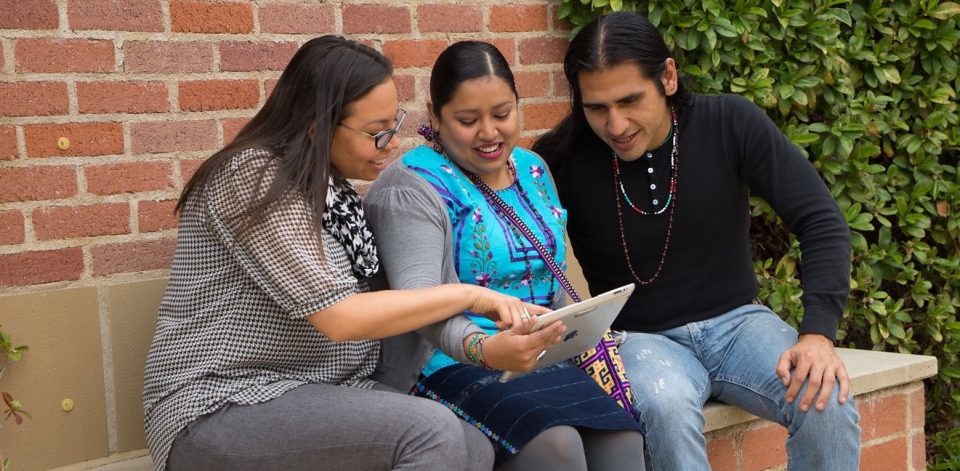
By CDH Guest Author on December 19, 2016
When arriving to UCLA in 2008, I was surprised to see just how decentralized the campus was in approaching the technological needs of the students, faculty, and staff, and the larger need for us to work across disciplinary fields. Designations of north vs. south campus, colleges vs. schools, centers vs. departments may make sense in economic terms, but they often hinder innovation and scholartistic work. A useful case in point could be the Wiki for Indigenous Languages (WIL) described in the recently published Indian Country Today on-line article.
I had the idea in early 2009 to create a web-based platform that would enable indigenous language learners to develop custom websites based on their respective community’s needs. For the brainstorming stage, I worked collaboratively with game theorists, CMS programmers, linguists, indigenous technology users, tribal education scholars, and digital humanities scholars (though I’m not regularly comfortable with calling our work “humanities” in contradistinction with “arts” or “science”). However, even with a dream team, we needed more than ideas. We needed a means to communicate, a certain number of people who would take the lead on various aspects of the project, and of course money to make these and other aspects possible. With a little seed money from the USC-NEH Vectors Fellowship, I could get the seed planted off-campus. But how would such a seed grow here at UCLA, my institutional home?
The Wiki for Indigenous Languages (WIL) would literally be non-existent were it not for a network of supportive offices and colleagues. I tapped into my research account, made possible by a Dean interested in recruiting me to UCLA the year before. I then reached out to the UCLA Center for Digital Humanities. They were able to suggest several staff members and students who had the skillset to work with the USC programmers on the initial coding. One of their suggestions, Michael Lynch, a UCLA student in 2009, has worked on the site through three incarnations and remains the lead systems administrator for the WIL site. And as important as the programmers, most of us with digital project ideas simply need good counsel. HumTech’s Academic Technology Manager, Dr. John Lynch, has been the facilitator without peer, not just connecting me with possible sources of funding, but also the information technology specialists and systems administrators across campus. With support from the UCLA Office of the Vice Chancellor for Research in the form of a Transdisciplinary Seed Grant, the project came into fruition, aka “went live” in 2013.
The common ground across the arts, humanities, and social sciences remains the need for support when a creator has a new idea. Whether scholars, technicians, scientists, artists or activists, we are all essentially creators. We have these ideas, occasionally great ones; but then what? As in life, we should be fostering ideal environments for growth and nourishment; and the academic world is no different. Being a college campus charged with ingenuity, we rely on people, funding, and actual physical spaces to incubate new ideas. In these ways, we have some promising resources: the Scholarly Innovation Lab in the remodeled Young Research Library; the Research and Instructional Technology Consultant program; the renewed support this year for Transdisciplinary Seed Grants; the UCLA Digital Humanities Seminars and community lunches; and of course the continued support from the Humanities Division for the Center for Digital Humanities. North campus folk have been too long developing incredibly valuable ventures without campus-wide infrastructure. I could speak at length about how more is needed to foster digital innovations at UCLA, but it suffices to say “thank you” to the many people (so many not listed here) who help foster the UCLA community around digital scholarship theory and practice. We do have a great group of colleagues around us. And this time of year seems apropos to recognize such gratitude. I look forward to working closely with them as we watch the Wiki for Indigenous Languages grow, and in the development of my next project, the Archive of Healing, Ritual, and Transformation.
David Delgado Shorter is a Professor in World Arts and Cultures/Dance at UCLA, and the Director of the Wiki for Indigenous Languages as well as the Archive of Healing, Ritual, and Transformation.
Read more about the Wiki for Indigenous Languages here: https://indiancountrymedianetwork.com/education/native-education/wiki-for-indigenous-languages-using-technology-to-stop-language-loss/
Resources:
- Wiki for Indigenous Languages. http://wil.cdh.ucla.edu/
- Transdisciplinary Seed Grants at UCLA. https://vcr.ucla.edu/fy17-tsg
- Scholarly Innovation Lab at UCLA. https://humtech.ucla.edu/research/scholarly-innovation-lab/
- Research and Instructional Technology Consultant (RITC) program. https://humtech.ucla.edu/support/instructional-tech/research-and-instructional-technology-consultants/
